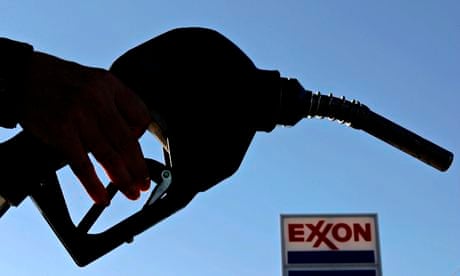Some of the most powerful forces of the modern world have this month entered into an engagement that puts international security at stake.
"Throughout the 21st century, climate change impacts are projected to slow down economic growth, make poverty more difficult, further erode food security, and prolong existing and create new poverty traps." So said the world's leading authority on climate change, the United Nations Intergovernmental Panel on Climate Change (IPCC) in its penultimate assessment report on 31 March.
On the same day, the oil giant ExxonMobil said it believed that fossil fuels were likely to provide three quarters of the world's energy in 2040, despite acknowledging that carbon dioxide emissions created by burning fossil fuels were raising global temperatures.
Exxon released this perspective in order to reassure shareholders who might be concerned that policy to limit greenhouse gases (GHGs) would render the company's primary asset stranded in the future. "The scenario where governments restrict hydrocarbon production in a way to reduce GHG emissions 80% during the outlook period [to 2040] is highly unlikely," it said.
However, if dangerous consequences of climate change are to be avoided, the science demands that global GHGs are indeed reduced by 80% by 2050. By implying that governments are impotent in efforts to achieve this, Exxon's statement presents the world with the greatest challenge ever faced. Can this really be a comfort to shareholders – or for that matter, anyone else?
That Exxon is the first major oil and gas company to produce a report on the impacts of climate change on its business is commendable; but the content was quickly tested by Christiana Figueres, the UN's top climate official. She dealt a responsive blow, stating that the oil and gas industry must accept that three quarters of fossil fuel reserves will stay in the ground if the science-based target of limiting warming to within 2C is to be met.
Will Exxon's prophesy be self-fulfilling? It has certainly campaigned powerfully against climate change mitigation policy in the past and corporate might cannot be underestimated. To understand this, one need look only to a recent British carbon price floor freeze: incentive for heavy industry to decrease fossil fuel dependency was reduced largely as a result of lobbying from the Confederation of British Industry.
However, transformational influence can emerge in many forms. Exxon has since agreed to meet shareholder requests to disclose more vital information, this time on the environmental risks of hydraulic fracturing. Other industry players are following suit: Royal Dutch Shell will include a perspective on GHGs in its sustainability report this month and Total of France plans additional disclosure on the issue later this year.
Many understand the case for climate change mitigation, and in some parts of the world a new social contract of renewed accepted responsibilities is emerging. Protecting the citizen tops the list of governments' to-do lists. Inability to perform this function leads to other powers moving to protect us.
A campaign for divestment of fossil fuel companies has been sweeping the globe. It calls chiefly on those with a vested interest in citizens' futures – colleges, universities, cities and religious institutions – to join the campaign.
Pope Francis recently made the headlines, having received a letter from Australian and North American multi-faith groups requesting his support for fossil fuel divestment on the grounds that it is "immoral" to profit from fossil fuels. This followed Archbishop Desmond Tutu's proclamation, that: "People of conscience need to break their ties with corporations financing the injustice of climate change." Calling for investors to take appropriate action with regard to fossil fuels, the Nobel peace prize winner continued: "It makes no sense to invest in companies that undermine our future."
The Prince of Wales's Corporate Leaders Group has just revealed that 70 businesses have signed a call for governments to cap cumulative carbon emissions since the industrial revolution to 1tn. Recognising the problem is a start. More than 4,500 companies are using CDP's programmes for measurement and management of their environmental impacts, and investors representing more than a third of the world's invested capital have access to these corporate disclosures to inform and guide their engagement on environmental management and opportunities.
The IPCC has released the final chapter in its climate change assessment report. While pundits debate the cost of climate change adaptation versus mitigation, the urgent need for progress is clear. Exxon's inadvertent challenge to national governments to introduce policy that will limit greenhouse gas emissions at the scale and pace required has now been firmly reiterated by the UN.
Last time humanity faced such a terrifying test, Winston Churchill commented: "The odds were great, our margins small, the stakes infinite." Now is the time for the existing economic and societal forces to decide which side they want to fight for.
Paul Dickinson is founder and executive chairman of CDP, an independent non-profit organisation that has pioneered the only global environmental disclosure system.
Join the community of sustainability professionals and experts. Become a GSB member to get more stories like this direct to your inbox
